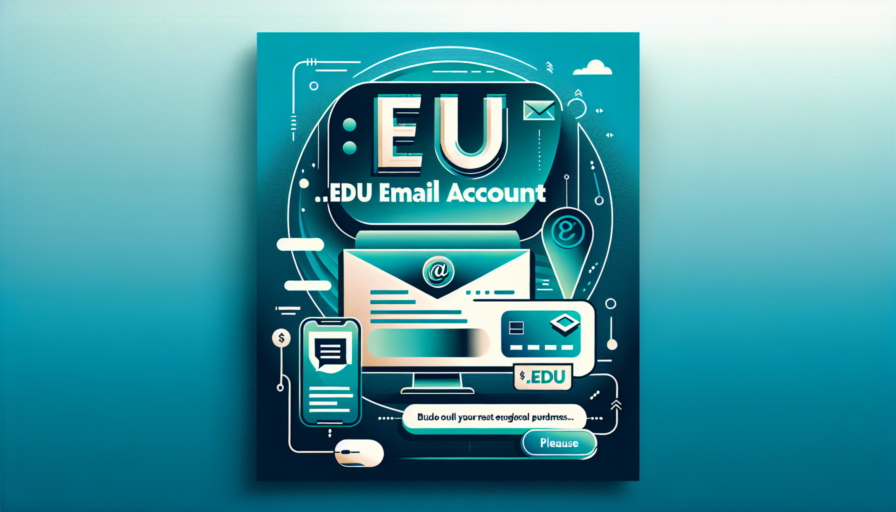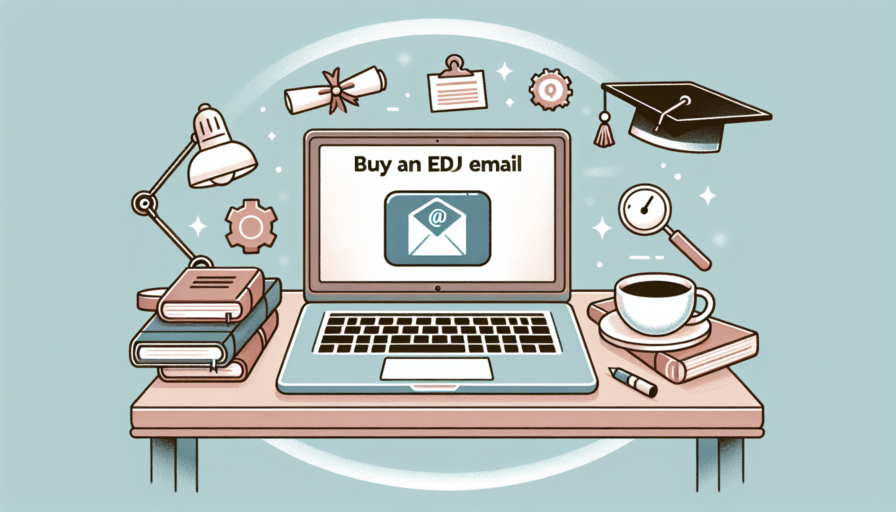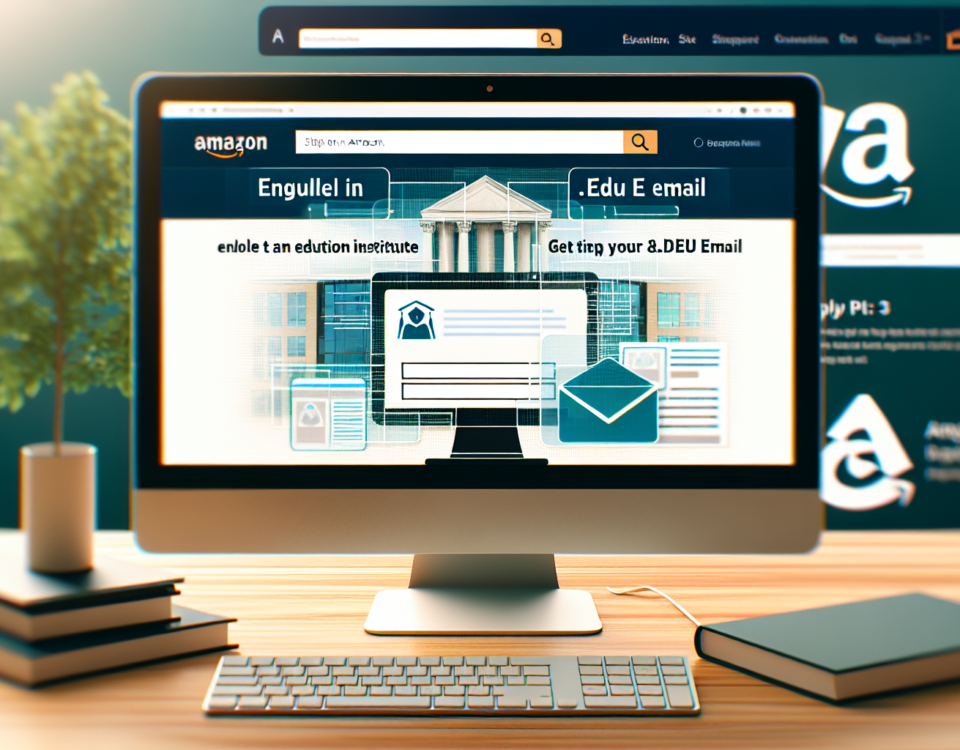Ultimate Guide to Edu Email Login: Access Your Academic Account with Ease
February 15, 2024
Ultimate Guide to Outlook Edu Email: Setup, Benefits & Tips for Students and Educators
February 15, 2024What Is an Email Edu Account and Who Qualifies for One?
An email .edu account is a type of email address that is typically issued by educational institutions such as colleges and universities to their students, faculty, and staff. The “.edu” part of the email address is a top-level domain that is reserved specifically for post-secondary educational entities in the United States, and it signifies a level of authority and legitimacy in the academic environment. One of the unique aspects of an .edu email is its eligibility for various educational discounts and access to academic resources that are not readily available to the general public.
To qualify for an email .edu account, one must generally be affiliated with an educational institution that is accredited by an agency recognized by the U.S. Department of Education. This primarily includes enrolled students, active faculty members, and employed staff at these institutions. Upon admission or hiring, individuals are often automatically granted an .edu email address, which will be their official means of communication for all academic and institutional matters. Just as importantly, .edu emails often serve as a gateway for accessing exclusive academic databases, software licenses, and subscription services that are tailored for educational purposes.
However, not all educational institutions may offer .edu email accounts. In some cases, secondary schools or non-accredited educational programs might be unable to provide these email addresses. Additionally, alumni may or may not retain access to their .edu email account after graduation, as policies on this vary widely among different institutions.
It is worth noting that the privilege of having an email .edu account comes with certain responsibilities. Users are generally expected to uphold the academic institution’s policies regarding email communication and digital conduct. Misuse of these accounts can lead to consequences such as revocation of email privileges or other disciplinary actions. As .edu email addresses are regarded as professional academic tools, maintaining the integrity and security of these accounts is taken seriously by educational institutions.
Top Advantages of Having an Edu Email Account
When it comes to university-affiliated email addresses, .edu emails stand out for several reasons. A .edu email account is not just a means to communicate with peers and professors, but it’s a passport to a myriad of exclusive benefits. Firstly, one of the primary advantages of having an edu email account is access to discounted or even free software and subscriptions. Academic institutions often negotiate with software providers to offer their students access to industry-standard tools at a fraction of the cost. This can include leading software in fields like design, engineering, and data analysis that can be cost-prohibitive to individuals without an educational discount.
Moreover, an edu email address often serves as a key to unlock vast digital libraries and academic databases. Typically, only members of educational institutions have the privilege to dive into extensive repositories of journals, papers, and books required for research and learning. This access is invaluable for students and scholars for whom keeping abreast of the latest findings and theories is essential. What’s more, this ocean of knowledge is accessible anytime and anywhere, as long as you have your edu email credentials at hand.
In addition to academic resources, .edu emails are also your ticket to a variety of exclusive discounts on products and services. From technology giants offering reduced prices on gadgets to online services presenting premium features at no cost, these perks help students manage financial burdens while enjoying modern conveniences. Retailers and online merchants recognize the significance of supporting the educational community and are often willing to provide substantial discounts to help facilitate a favorable learning environment.
Finally, an often overlooked but significant perk of having an edu email account is the networking opportunities it presents. Your edu email address is a signal to potential employers and colleagues that you are part of an academic institution, opening doors to networking opportunities and career-related events. It serves as a trust indicator and often allows for participation in exclusive groups or societies where like-minded students and professionals connect and share ideas, job postings, and collaboration opportunities.
How to Acquire Your Own Edu Email Account
Obtaining an edu email account may seem like a daunting task, but for students and educators, it is quite possible and comes with a plethora of benefits including discounts on software, hardware, and various services. Edu email accounts are typically provided by educational institutions to their enrolled students and employed faculty. However, individuals not directly associated with a university may find alternative routes to acquire such credentials.
Enrollment in Educational Institutions
The most straightforward path to securing an edu email address is by enrolling in an educational institution. Whether you become a full-time student or enroll in a community college or an online course that offers accreditation, you can become eligible for an edu email. Once enrolled, upon registration, most colleges and universities will assign a unique edu email address which can be used for academic and campus communication as well as to access educational discounts.
Online Courses and Community Programs
For those not seeking full-time enrollment, certain online courses and community education programs provide a way to obtain an edu email address. Many educational platforms partner with accredited institutions and may offer email accounts to participants. Additionally, some community colleges extend the privilege of an edu email to non-degree seeking or continuing education students, thus opening the door to email acquisition without traditional enrollment.
Checking Institutional Policies
It’s important to check with the specific educational institution’s IT policies to understand the eligibility and process for acquiring an edu email account. Many universities have straightforward steps detailed on their websites. Generally, after becoming eligible through enrollment or program participation, individuals must complete a verification process which can usually be done online through the institution’s portal. Once the process is completed, the edu email account will be activated and ready to use.
Remember, obtaining an edu email account should be done through legitimate means, respecting the terms of service of the institution providing it. Illegitimate methods to acquire an edu email not only breach ethical guidelines but can also result in legal repercussions and the revocation of the email account.
Maximizing the Use of Your Edu Email for Scholarships and Discounts
Many students are unaware of the potential benefits that come with their educational email addresses. Beyond simply serving as a means of communication, .edu emails can be a gateway to a treasure trove of scholarships and discounts. Academic institutions collaborate with various organizations to offer exclusive opportunities to their students which often requires a valid .edu email for verification. By actively using your university or college-issued email, you can access a multitude of financial aids and cost-saving deals that ease your educational journey.
When it comes to scholarships, your .edu email can act as a key to unlock exclusive educational grants. Many scholarship committees give preference to applicants applying through their school-provided email, viewing it as a sign of credibility and commitment to academic pursuits. It’s imperative to regularly check your .edu inbox for emails from your school’s financial aid office or external scholarship announcements. Moreover, several online scholarship databases require users to sign up with an .edu email address to filter opportunities specifically tailored to college students, making the scholarship hunting process more streamlined and efficient.
Aside from scholarships, discounts galore await for those savvy enough to utilize their .edu email account. Tech companies, such as Apple, Microsoft, and Adobe, significantly reduce prices on software and subscriptions for students. Retailers and service providers also offer markdowns on necessities ranging from laptops and mobile phone plans to clothing and transportation. It’s a smart move to inquire about discounts before making any purchases and flaunt your .edu email to snag that sweet student deal.
While many students might limit the scope of their edu email to educational correspondences, its true value lies in the perks and savings it can unearth. Always be on the lookout for emails from your institution’s partnership programs and remember to sign up for student discount platforms that specifically cater to .edu addresses. This proactive approach not only helps manage education costs but also introduces you to a diverse array of resources that support your academic and professional development.
Maintaining Security and Privacy with Your Edu Email
Edu email accounts are not just gateways to academic resources but also vaults of personal information. Students, faculty, and staff utilize these accounts extensively, exchanging sensitive personal and institutional data. Consequently, maintaining stringent security protocols is not an option—it’s a necessity. Phishing attempts often target educational institutions due to the wealth of information they hold. Vigilance is key; one should be cautious about unexpected email requests, especially those asking for login credentials or personal information. Even an innocent-looking email could be a well-crafted trap by a cybercriminal.
Another vital aspect is password integrity. Your edu email password should be unique and complex, incorporating a mix of letters, numbers, and symbols. Avoid recycled passwords that you’ve used on other platforms as this can become a single point of failure, potentially giving attackers access to all your accounts. Implementing two-factor authentication (2FA) adds an additional security layer, ensuring that the person accessing the account has been legitimately verified. Many educational institutions now offer or even require 2FA for educational email accounts, recognizing its importance in protecting academic identities and resources.
On the privacy front, when using your edu email, be mindful of the information you share. Remember that email administrators might have the ability to monitor accounts and access emails if they need to. For private conversations or delicate matters, consider secure alternatives that provide end-to-end encryption. Additionally, your edu email might be subject to freedom of information requests, so it’s essential to keep professional communication within it, separate from personal exchanges that may not be intended for potential public viewing.
Regularly reviewing account security settings is another step toward safeguarding your information. Consulting with your institution’s IT department on the best practices for using edu emails, attending security-awareness workshops, and staying informed about the latest security updates can significantly enhance your email’s security posture. Be cautious of where and how you log in to your account, avoiding public computers or unsecured networks that could put your credentials at risk. Your vigilance in managing your edu email effectively defends your academic and personal life against potential cyber threats.







